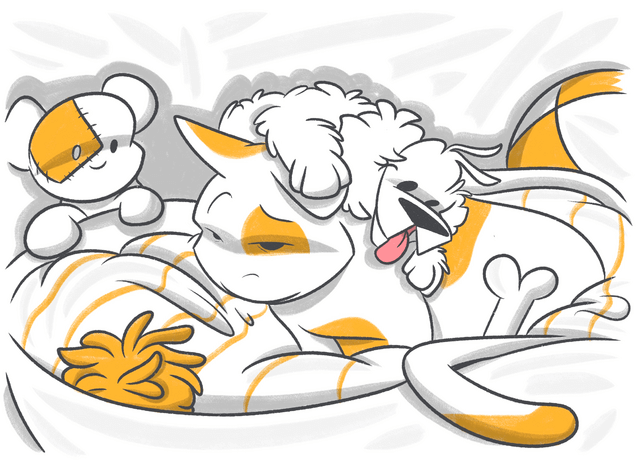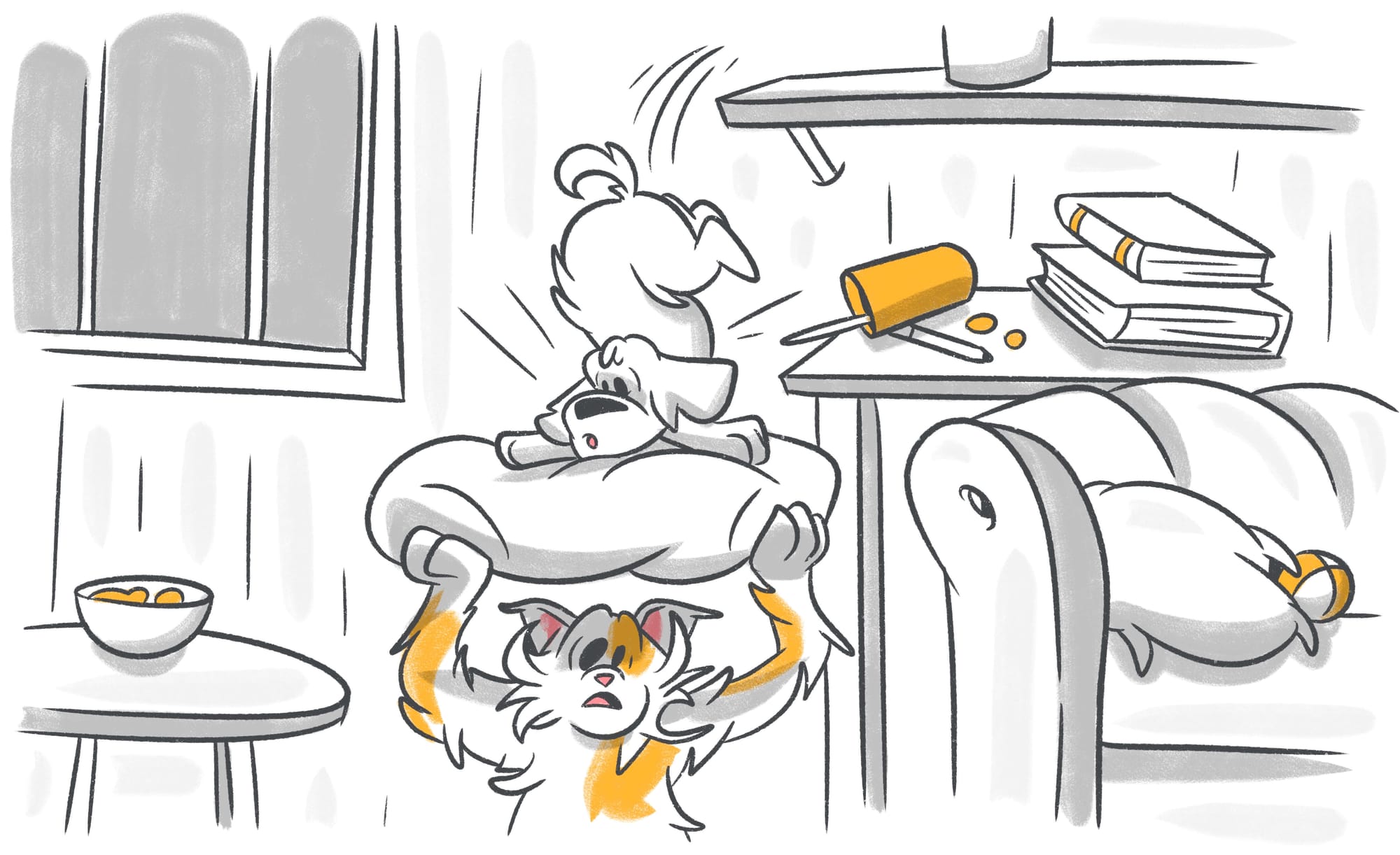As the proud parent of a three-month-old British Bulldog, I can hold my hands up and say that puppy whimpering and crying is one of the worst things about puppyhood. It tugs on my heartstrings and makes me want to give poor Frank the Bulldog whatever he wants. That’s not conducive to a happy home, though.
Learning how to calm your puppy down when they’re crying, overexcited, or nervous is essential, and I’m going to share with you the best and worst ways. (I learned the absolute hardest way.)
Stop Googling - Ask a Real Vet
Content:
- Why Do Puppies Cry
- 8 Methods to Calm Your Puppy
- How to Calm a Puppy Down at Night
- When Do Puppies Calm Down
- FAQs
- Conclusion
Why Do Puppies Cry
What makes you cry? Sadness, loneliness, loss, nervousness? Your little puppy will experience all of those emotions and more, so it’s natural that they will also experience crying, whimpering, and whining just as humans do.
Your new puppy is likely whining because they miss their siblings, parents, or old human parents. Alternatively, they might cry for the following reasons:
- Feeling pain;
- Overexcitement;
- Fear or nerves;
- Hungry;
- Thirsty;
- Need to pee or poop;
- Missing pet parents;
- Attention-seeking;
- Separation anxiety;
- Overwhelm or overstimulation;
- Adjustment period (such as a new home);
- Curiosity;
- Frustration;
- Feeling locked in or confined;
- Health problems;
- Changes to hormones (such as puppy puberty);
- Irritants or allergies.
8 Methods to Calm Your Puppy
Puppies behave much better and are calmer when they have a set routine that starts from the first day you get them home. This means setting bedtimes, feeding times, bathroom breaks, and play/rest times. Once your pooch has learned the routine, they’ll know what to expect and when to expect it. Consistency will help them feel a lot more relaxed.
Here are 8 more methods to calm your puppy:
1: Safe Space
Puppies are sensitive to their surroundings, so make sure that they have a place they can run to and hide in when they feel overwhelmed, scared, or anxious. Ensure the space is quiet, calm, and free from excessive stimuli like loud noises or high activity.
2: Monitored Crate
If your puppy is comfortable in a crate, it can serve as a safe space. You should introduce crate training slowly as soon as you get your new pet home to allow them to get used to it.
3: Strokes and Love
Offer gentle petting, stroking, or a massage to help soothe your puppy. Establish a bond through calm physical contact and speak in low, soft tones. Your puppy loves you the most, so you’re the one who can love them back to calmness.
4: Remain Calm
Puppies can pick up on human emotions. Remaining calm and composed can help reassure your puppy in stressful situations. If you need to, walk away and take a deep breath. Getting angry or upset with your pet could result in them becoming scared of you, which I’m sure is the last thing you’ll want.
5: Mental Stimulation and Distraction
Engage your puppy in training exercises or mental stimulation games to help redirect their energy and focus. This can help reduce anxiety and tire them out mentally, and it can also serve as a distraction, stopping them from doing whatever it is you don’t want them to do.
6: Toys, Chews, and Treats
Chewing can help puppies relieve stress and anxiety. Offer appropriate chew toys or treats to redirect their attention. It’s not wise to reward negative behaviors with treats, but if your pooch is scared or anxious, food can work as a welcome distraction. Using their absolute favorite treats and toys should work quite well.
7: Soothing Music
In the UK, one classic musical station plays soft, soothing music on the 5th of November (and sometimes a night before and after) because of the fireworks that accompany Guy Fawkes Night. The music helps to calm dogs when bangs and booms explode all around them. You can do the same thing: find your pet’s favorite type of music (or try classical) and let it play to soothe them.
8: Exercise
The American Kennel Club research shows that providing your pup with adequate amounts of exercise throughout the day leads to higher levels of obedience and less riotous behavior. If you’re not providing enough exercise, your pup will have excess energy when you don’t want them to.
Taking them out for a walk is just as much for your benefit as it is theirs!
How to Calm a Puppy Down at Night
If you take your puppy to bed at the same time every night, they’ll eventually get used to that time and know it’s time for bed without you even having to tell them. The first few nights are likely to be a little difficult, but using pet tech, such as the Petcube Play 2, will help you communicate with your pet and reassure them that you’re still home. Not only that, but you can also check on them periodically, watch over the night’s video footage, get alerts when they’re moving around or making sounds, and even play with them via the remote laser.
When Do Puppies Calm Down
Your puppy will calm down when everything and everyone in their surroundings is also calm. You’ve got little chance of getting them to lie down and go to sleep when the kids are running rampant, the washing machine is making a bunch of noise, and the TV is blaring loud. You should think of your new puppy a little like a newborn baby. If there’s lots of noise and activity around them, they’re not going to be calm and quiet.
If your pet doesn’t seem to calm down, there could be a medical cause. Petcube’s Emergency Fund gives you access to licensed vets around the clock, right from your cell phone. For just $29 per month, instant vet advice isn’t the only thing you’ll get, there’s also $3,000 worth of emergency care cover, covering up to six of your furry friends. And to say thank you for being our loyal blog reader, we’d like to say thank you by offering 27% off the regular price. Learn more by clicking this link.
FAQs
Why is my puppy so hyper?
Puppies are hyper by nature, but usually for short bursts at a time. They’ll sleep, wake up, get the zoomies, feel tired, and repeat. Some breeds are naturally more active than others greyhounds are going to be considerably more energetic than British Bulldogs, for example. Younger pups are generally more active than their older counterparts, and behavioral or health issues can also cause hyperactivity.
Why do dogs get so excited when you come home?
Dogs have a particular fondness for routine, anticipation, and the bond they have with you (the pet parent). Whether you’ve nipped out for ten minutes or been out of the house all day, your dog will always be super excited to see you when you get back.
Conclusion
It is perfectly normal for your puppy to be a bit, well, loopy. You’re learning about your new pet, and they’re learning about you. They’re probably going to push the boundaries to find out what is and isn’t allowed. They don’t know anything until you teach them. You should consider them a blank canvas.
If you have any concerns about your pet’s behavior, whether it’s hyperactivity, not moving, or just seeming a bit ‘off,’ always seek advice from a vet. It’ll put your mind at ease and ensure your pup’s in tip-top health.
Was this article helpful?
Help us make our articles even better









